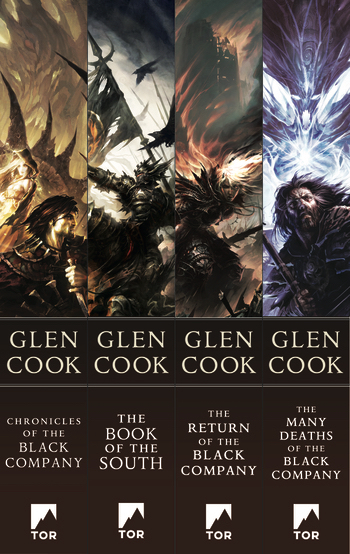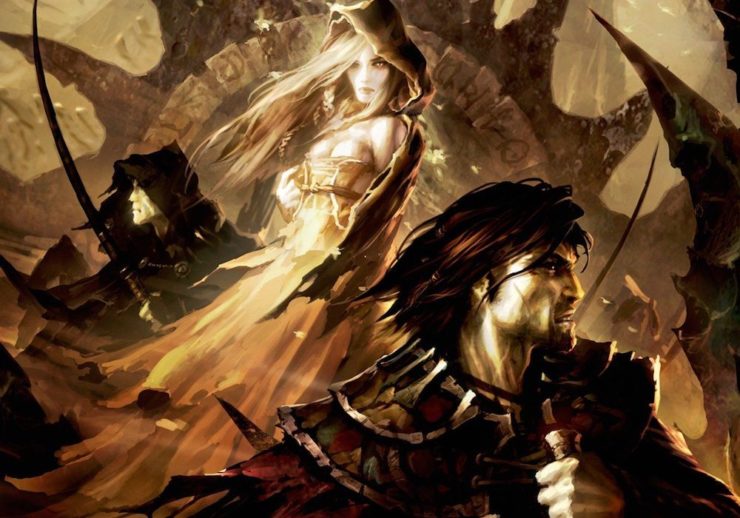Glen Cook’s classic fantasy series, The Black Company, has largely flown under the radar in the 19 years since its ostensible conclusion with Soldiers Live (published in 2000). But with the recent publication of a new “interquel,” Port of Shadows, and the announcement one year ago that Eliza Dushku was planning to produce and star in a potential TV adaptation, The Black Company is seeing a resurgence. (It’s unclear how reliable the source is, but according to IMDB, the show is listed in pre-production as of April 2019.)
The series generally regarded as a sort of godfather to the now-popular grimdark subgenre, The Black Company could make for an ideal follow-up in the wake of HBO’s adaptation of A Song of Ice and Fire.
Like George R. R. Martin’s bestselling series, The Black Company takes a distinctive approach to a traditional fantasy world. Good and evil aren’t clear-cut; the blurred spaces between are constant battlegrounds of personal morality and larger stakes and ambitions, with the mercenaries of the eponymous Company often caught in the midst of bigger personalities and powers.
Unlike A Song of Ice and Fire and Game of Thrones, however, The Black Company keeps the focus on a more limited cast and rarely spends time outside of more than one or two locations at once. This more focused approach would be ideal for a TV series, giving the writers more time to dig into the varied and colorful personalities of the Company, rather than jumping all over the world with shorter scenes featuring a huge cast.
The Black Company also gives audiences a chance to grasp some of the realities of war, of being a soldier, that we could all benefit from understanding. As author and veteran Myke Cole wrote in a recent essay, soldiers “try and they fail, just like we do. But it is in the fact that they do not always fail that we can draw inspiration.” Glen Cook, too, is a veteran, and he strove to write an authentic portrayal of a soldier’s life. The popularity of his books among service members is testament to his success.
Buy the Book


Annals of the Black Company
The Black Company, given the proper treatment, is a perfect opportunity for audiences to connect with the lives of soldiers, perhaps getting the barest glimpse into what it means to be isolated into a community of brothers (and sisters) with the sole purpose of advancing war. The members of the Company, like many real-world veterans returning from overseas theaters, struggle to assimilate into normal culture. They find solace in those who understand them, and do not expect to be treated as heroes. Rather, the mercenaries of the Black Company are, across the board, fallible humans, trying to find their way in a difficult moral landscape.
It is this aspect of grimdark that is likely the key to its popularity. Readers and viewers want characters they can relate to—not perfect kings and princes and heroes, but everyday men and women who make mistakes, and rise above them.
The Black Company is full of such characters. Whether it’s the enigmatic Raven—a man built upon mistakes and regrets—or the Captain himself, torn between duty to his brothers and upholding the honor of the Company, sympathetic characters abound. Then, of course, there’s the colorful wizard duo of Goblin and One-Eye: best friends perpetually at loggerheads, masters of pranks and all manner of skullduggery. When the world is beating down on the Company, these two can always be counted on to lighten the mood.
Additionally, with the option to frame the story through the Annals (as in the books themselves), a Black Company TV series can draw the characters out in a closer, more intimate manner. With Croaker serving as the lens through which everything is filtered, audiences will get to know this main character on a deeper level than is possible in more traditional TV storytelling.
As Game of Thrones has proven (along with other HBO offerings, like Deadwood), a largely character-driven story with shades of morality can develop an ardent following. Perhaps more importantly, Cook’s series tells a wholly different kind of story from A Song of Ice and Fire and the other big-time epic fantasy series also in line for screen adaptations, like The Wheel of Time, The Kingkiller Chronicle, and Brandon Sanderson’s various works. That unique element will help The Black Company stand out in what appears to be an increasingly crowded SFF TV adaptation landscape.
Given the proper budget and the spectacle present in the source material, The Black Company has all the makings of a worthy successor to Game of Thrones in the genre TV canon.
Drew McCaffrey lives in Fort Collins, CO, where he is spoiled by all the amazing craft beer. He co-hosts the Inking Out Loud podcast, covering science fiction and fantasy books (and some of that Colorado craft beer). You can find him on Twitter, talking about books and writing, but mostly just getting worked up about the New York Rangers.










